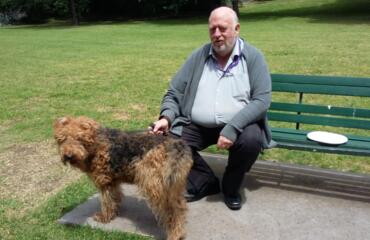
David Leyonhjelm takes to his feet in the Senate. PIC: Fairfax Media
Australia’s first libertarian senator, David Leyonhjelm, suspects Clive Palmer’s Senate chums are “economically naïve” and just don’t get the Budget emergency.
The 62-year-old former veterinarian-cum-agribusiness consultant, who is advocating even harsher fiscal measures than those that are giving the Abbott Government electoral discomfort, has used his first days in the chamber to size up his newfound crossbench colleagues.
Senator Leyonhjelm has already formed an alliance on economic matters with Family First Senator Bob Day, but says it is too early to tell just how the Palmer United senators, the so-called ‘PUPs’, will operate.
“At the moment they are still very loyal to Clive Palmer, especially Dio Wang and Glenn Lazarus,” he told The Citizen. “Jacqui Lambie is the one most likely to deviate from Clive’s position.”
“They don’t understand the budget imperatives. They don’t understand that taxpayers’ money, government money, is their fellow Australians’ money.” — Leyonhjelm on the PUPs
But Senator Leyonhjelm is uncertain about the PUPs’ political and economic credentials.
“My reservations about the three of them are that they are economically naïve, if I can put it that way. They don’t understand the budget imperatives. They don’t understand that taxpayers’ money, government money, is their fellow Australians’ money”.
The disparate group of PUP senators looks to be difficult to corral — even for the eponymous party founder himself — with Senator Lambie’s recent talk of a Chinese attack on Australia culminating in slavery sending the media wild.
Senator Leyonhjelm is less concerned about invasion than sorting out the stalled budget which he says is having a negative psychological impact nationally. He was elected on 9.5 per cent of the primary vote in last year’s federal poll, allegedly thanks to voters confusing his Liberal Democratic Party with the Liberal Party of Australia on the ballot paper.
In May, his proposed alternative budget was published in the Financial Review the day before Treasurer Joey Hockey released the Government’s fiscal blueprint. The Senate newcomer argues that Mr Hockey should have cut taxes, particularly for the middle-class.

“We think they are overall stimulatory and they would generally lead to higher incomes, higher taxes and therefore higher tax revenue for the government”. His budget proposals support labour market reform, a freeze on the minimum wage and the deregulation of higher education. He would go further with pension cuts and ending corporate welfare.
But Senator Leyonhjelm is not holding his breath. He is more confident about the prospects for one of his other legislative priorities: a marriage equality bill, which he intends tabling in the Senate once the Coalition agrees to a conscience vote for its MPs.
“There will be a party vote taken in the Coalition party room as to whether or not they have a conscience vote and I think the numbers are there,” he said. “Now, what happens after that I couldn’t predict because it will need a majority of senators and a majority of members in the House [of Representatives] for the bill to get through.”
Senator Leyonhjelm admitted: “The thing is, libertarians are a little bit like socialists. They live in a dream world at times and like to dream about what should be, rather than what’s achievable”.
His support for gay marriage is intrinsic to his libertarian philosophy, and he has ranked as an overriding priority for this Senate term the education of Australians about the difference between tolerance and approval. Then, “if they start thinking that way, we will be a much freer society”. He plans on using this approach to try to convince Coalition members to vote for his gay marriage bill.
“When I talk to people about gay marriage, I say it’s no problem for you to disapprove of it,” the Senator from NSW continued. “What I’m asking for is for you to tolerate it. It’s not hurting you, it’s not hurting anybody else. There’s no necessity for you to invoke the power of the state to prohibit it, so just accept the fact that other people have a different view and move on.”
“When I talk to people about gay marriage, I say it’s no problem for you to disapprove of it . . . What I’m asking for is for you to tolerate it. It’s not hurting you, it’s not hurting anybody.” — Leyonhjelm on those who oppose gay marriage
Senator Leyonhjelm did not adopt a libertarian stance from reading philosophy. Rather, he didn’t like being told what to do by people purporting to have the authority of the state. Most people arrive at libertarianism, he said, because of specific issues that bother them when the government intrudes needlessly into their lives. This could be anything from abortion to drug regulation to traffic speed limits.
“It’s not just one area [people] should be concerned about . . . [I]f the government is intrusive in one area, then there’s a very good chance it will be intrusive in another.”
For Senator Leyonhjelm, a tipping point was conscription. While at university he lived with the anxiety around the prospect of being sent to the Vietnam War. Taking part in the moratoriums, he joined Young Labor. “I thought the only way you could have individual freedom was with socialism.”
After graduating in veterinary science, his travels took him behind the Iron Curtain. He recalls a greyscape with low standards of living and he began to question whether socialism was really able to achieve a utopia. Suppressing these doubts, Senator Leyonhjelm turned to theorists who dismissed the USSR model and who believed Africa was where true socialism flourished.
But travelling through Tanzania he witnessed extreme poverty and in South Africa, he saw the dire political situation of apartheid. And yet, the young Leyonhjelm noticed that under capitalism, South African blacks, even though politically repressed, had a better standard of living than their socialist neighbours.
“I thought this doesn’t compute – I can’t reconcile this any longer. So I started thinking maybe I’ve got this wrong. Maybe I’ve been wrong all along.”
Upon returning home, he quit Labor and joined the Liberals. The change of heart was anything but liberating. “It was actually a bit scary, because I thought the things that I believe in – I’m not sure I do believe them anymore. It’s not an easy thing to give up on – views that you’ve accepted as true and unshakable and then you think ‘Okay, maybe I’m wrong about that, maybe I need to revisit my ideas’.”
In the 1980s, Senator Leyonhjelm founded an agribusiness consultancy firm. “Starting your own business is instructive in terms of your politics,” he reflected. “You realise you’re paying a lot of tax and then you look for signs of value from that tax and you struggle to find anything.”
It was the issue of gun ownership that drew Senator Leyonhjelm into the “pointy end” of politics. He left the Liberals and joined the Shooters Party after Prime Minister John Howard’s tightening of gun laws in response to the Port Arthur massacre.
Almost every article and interview the Senator has given since his election has cited his pro-firearms stance. But he willingly engages on the issue.
“There’s a lot of nonsense talked about guns and very little objective assessment of, well, does gun control work any better than drug control? Or alcohol control in the prohibition days of America?
“There is a strong agenda within certain circles in Australia and, surprisingly, it is mainly left wing circles — which doesn’t really compute in left wing philosophy — but it’s mainly left wing circles that the best thing that Australia could do is get rid of all private ownership of guns. It’s a weird attitude because if that occurred, the only people with guns would be the state, the government. So the army, the military in general, the police, of course private security guards, would have all the guns — and criminals.”
However, on deciding that the milieu of the Shooters Party was generally homophobic, he left to join the Liberal Democrats.
“There’s a lot of nonsense talked about guns and very little objective assessment of, well, does gun control work any better than drug control? Or alcohol control in the prohibition days of America?”
In Australia, libertarianism remains on the political fringe compared to its embrace by many Americans. Where America has tended to defend the right of the individual, Australia has sought to arbitrate and reach a collective decision.
Senator Leyonhjelm reasons that libertarianism is less prominent in Australia because of the two countries’ dissimilar histories. “The culture is different,” he noted. “We don’t have a culture of revolution, of rebellion against the state, of a view that the government is not your friend. Those sorts of concepts are not all that well accepted in Australia.
“The closest we came to any genuine social revolution was the Eureka Stockade. We were settled by a mixture of convicts and free settlers who believed in responsible government and never really questioned, with the exception of a few Irishmen, the authority of the Crown. So we have to deal with the libertarian issue from a different approach in Australia.”
He cites the debates between the Enlightenment thinkers Thomas Hobbes and John Locke as pertinent in guiding his libertarianism. Hobbes viewed human nature as nasty and brutal and therefore argued society cannot function without relinquishing certain rights to the government to maintain order. In contrast, Locke believed citizens could function among themselves sufficiently save for the government’s role in ensuring the protection of life, liberty and private property.
“Now, when you consider those two options, a libertarian will always go for the Locke approach: the view that our rights are our own and the government doesn’t give them to us. I am very firmly in the Locke camp,” he said. “I would argue that fundamental rights are not bestowed by the state – they precede the power of the state. The state can take them away, the state can codify them in law, but they don’t originate from the state.”
“I was in Labor in my 20s, the Liberals in my 40s, the Shooters in my 50s and now I’m in my 60s and in the Liberal Democrats. It’s a reflection of my evolving politics . . . I have moved in the more liberal direction and I don’t accept that that’s right wing. Being small ‘l’ liberal is not right wing.”
Senator Leyonhjelm believes that citizens ought to feel less obligated to the state than perhaps they are expected to be in the current political climate. He sees individuals’ responsibilities to be foremost to their fellow human beings and to the preservation of key institutions. “Respect for law, respect for private property, respect for life and liberty and the institutions that maintain them — so, the court system, the judicial system and so forth.” Other services, such as health and education, function best when privatised and market-driven.
Given that philosophy, it is unsurprising that Senator Leyonhjelm should express concern about plans to tighten national security legislation. He acknowledges the disadvantage of not belonging to a major party: “All I can do is argue against it and vote against it and try and make a fuss. But there is a limit to how much of an effect that will have.”
Deregulate where regulation is unnecessary is a Leyonhjelm maxim and it is easy to understand how he has arrived at this position.
“I was in Labor in my 20s, the Liberals in my 40s, the Shooters in my 50s and now I’m in my 60s and in the Liberal Democrats,” he said. “It’s a reflection of my evolving politics and it reinforces the point I made earlier that I’m a first principles libertarian more than a philosophically driven libertarian.”
But he added: “I have moved in the more liberal direction and I don’t accept that that’s right wing. Being small ‘l’ liberal is not right wing.”
The Senate newcomer, just a few days into his parliamentary term, is looking forward to the next six years, and having just finished Bob Carr’s Diary of a Foreign Minister, hints at his own memoir down the track.
“I thought it was interesting for a new politician like me to be reading about the challenges and issues he had to deal with. I am keeping a diary and, in fact, there’s a possibility I may do a book of my diary in a year or two’s time.”



